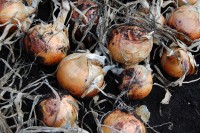Event Details
Date
February 28, 2018
Time
9:00am-3:30pm
Location
Cornell Cooperative Extension Orange County
18 Seward Ave, Suite 300
Middletown, NY 10940
Cost
$60.00 Enrolled ENYCHP Members
(additional attendee $60.00 ea.)
$75.00 Non-Enrolled
(additional attendee $75.00 ea.)
At the Door
$85.00
Host
Cornell Vegetable ProgramEVENT HAS PASSED
Orange County Onion School
February 28, 2018
Save $25 if you attend both the Onion School and the March 1st PSA Grower Training Course. To register for this bundle deal, CLICK HERE
Agenda:
8:45-9:15 Sign In, DEC Credit Registration, Coffee
9:15-9:20 Welcome
9:20-10:05 2017 Herbicide Trial Results and Recommendations, Christy Hoepting- CCE CVP
10:05-10:20 Food Safety Modernization Act and GAPs Updates for 2018, Erik Schellenberg- CCE Orange County
10:20-10:45 Ozone Systems for Post-Harvest Black Mold Management, Noel Currie- Currie Chemical Company
10:45-11:00 Coffee Break
11:00-11:45 Onion Thrips and Onion Maggot Management Strategies, Dr. Brian Nault- CU Dept. of Entomology
11:45-12:10 Allium Leafminer Report, Ethan Grundberg- CCE Eastern NY Commercial Horticulture Program
12:10-12:50 Lunch (Catered from Quaker Creek Store)
12:50-1:15 RiteYield and RiteTrace Systems for Precision Farming and Food Safety, Bill Menkveld- GreenTronics
1:15-2:15 Stemphylium Leaf Blight Fungicides and Resistance Management Workshop, Ethan Grundberg and Christy Hoepting
2:15-2:45 PlantTape Onion Trials in Georgia, Brian Antle- Tanimura & Antle Produce Company
2:35-3:15 Pink Root Management Trials in Idaho, Dr. Mike Thornton- University of Idaho Dept. of Plant Sciences
3:15-3:30 Wrap Up
Registration questions please call Abby Henderson at 518-746-2553, If you have program questions please call Ethan Grundberg at 845-344-1234



































